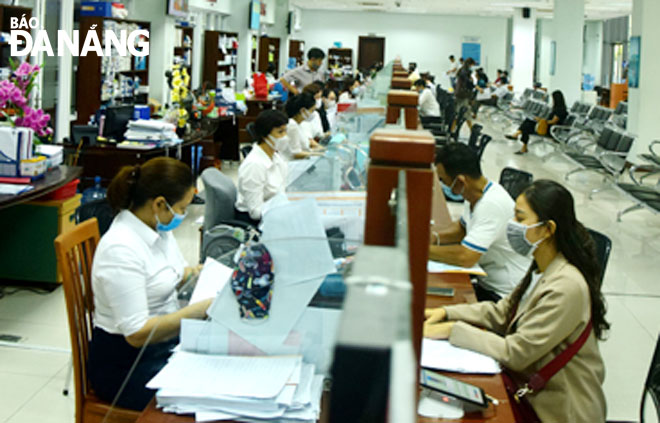Da Nang promotes IT applications for promoting digital transformation
Da Nang has secured its leading position for 12 years in a row in the Viet Nam ICT Index, the rankings on the readiness for information and communications technology (ICT) development and applications. This fruitful result showcases Da Nang’s great long-lasting efforts in creating a premise to elevate its comprehensive digital transformation process.
 |
| Thanks to promoting the effective application of IT in State-run agencies and online public services, Da Nang ranks first in the index of ‘IT application’. Photo: TRUONG HUY |
Gaining the maximum scores in many indicators in Viet Nam ICT Index 2020
Da Nang has taken the lead in the Viet Nam ICT Index 2020 for the 12th consecutive year. The result was announced on Tuesday by the Viet Nam Association for Information Processing and the Department of Information Technology under the Vietnamese Ministry of Information and Communications within the framework of the ongoing Digital Transformation Week – Hue event.
Da Nang scored 0.9238 points on the 1-point scale, followed by Thua Thien-Hue Province with 0.8162, Quang Ninh 0.6909, Can Tho 0.6845 points and HCM City 0.5852.
The Viet Nam ICT Index 2020 rankings were structured on the basis of five component indices, namely ‘technical infrastructure’, ‘manpower infrastructure’, ‘IT applications’, ‘online public services’ and ‘local IT industry assessment’, with over 100 indicators and the conduction of independent surveys, statistics, assessments and inspections.
Da Nang is the only Vietnamese city to have gained a maximum score in the category of ‘IT applications’ which consists of internal applications in State-run agencies and online public services.
The city ranked second after Thua Thien - Hue in technical infrastructure and behind Can Tho City in manpower infrastructure.
Motivations for speeding up digital transformation
According to Mr Nguyen Quang Thanh, Director of the municipal Department of Information and Communication, Da Nang has built up 560 data files. These data have been processed on platforms to turn themselves into smart services such as bus schedule notification apps, lookups on establishments meeting food safety and hygiene standards, and medical declaration apps.
Besides, Da Nang has also focused on building IT industrial infrastructure facilities, including the concentrated IT and software parks to support the creation of ‘made in Da Nang’ products for supplies to domestic and foreign markets.
In line with the current trends, the number of fixed telephone numbers, fixed broadband across the city is decreasing gradually, making room for the thriving of mobile devices, 3G, 4G and centralised internet connections in the context of on-going digital transformation in the city.
The high rate of people using mobile phones and the internet is also an advantage for the city to beef up digital transformations.
Despite being at the top position in the Viet Nam ICT Index for 12 consecutive years, Da Nang still has great potential to promote the development of IT applications.
The city is now on track to actively implementing smart city building models, digital transformation based on 3 main pillars: infrastructure, data and intelligence.
In addition to the optical fiber networks, the city data centre has developed Internet of Things (IoT) devices, smart and sensor systems to help collect data, turn raw data into useful ones and create smart services for the benefits of local residents and businesses.
Mr Dang Ngoc Hai, General Secretary of Da Nang Software Enterprises Association and the Director of the Da Nang branch of the Axon Active Viet Nam company in Hai Chau District underlined a must-do to train the leaders of the local authorities on digitisation solutions in tandem with helping specialised staffers enhance skills in building digital product ideas and managing projects.
Also important is the appeal for the gernal public to get acquainted to using digital products instead of traditional ones.
Meanwhile, Mr Nguyen Thanh Chung, Director of Viettel Da Nang, proposed that, in the context of the rapid Fourth Industrial Revolution, importance should be paid to investing in infrastructure and technologies in a bid to maintain the economic development as well as social security.
Viettel is willing to cooperate with Da Nang in implementing modern IT and telecommunications infrastructure such as 5G, IoT, data centres, boosting experience exchanges and consultancy, and the building of long-term, detailed digital transformation strategies.
Reporting by PHONG LAN- Translating by A.T